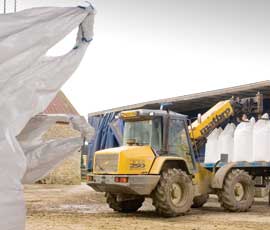Tackle challenges to your farm business head on

Sustainability
The common use of short-term farming agreements can mean long-term decision-making often does not come to the fore, with infrastructure such as buildings largely taken for granted. Farms need to plan for the long term to maintain efficiency and to be able to compete.
Another key challenge is that of balancing the principles of good agricultural husbandry with commercial reality.
As reports of agrochemical resistance in grassweeds and disease control become more prominent, we must revisit rotations and use the agronomic benefits they can bring. While farming income may drop with a change, profit could increase as smoother workloads and lower weed and disease pressure allow for lower costs of production.
- Draw up a plan for infrastructure maintenance and development.
- Consider the wider agronomic and operational benefits a different rotation could bring.
| Sentry conference 2013 |
|---|
There are just five tickets left for this well-established event. This year’s conference is on Wednesday, 6 February at the Rowley Mile Racecourse, Newmarket, Suffolk. Tickets cost £100+ VAT. To book your place visit the Sentry website or contact Jo Woods on 01473 812 010 or email jow@sentry.co.uk |
Skills development
Operational and management development is an essential part of any business, but successful formulae can become outdated very quickly. Changing physical and economic environments demand good understanding, constant fine-tuning and a multitude of skills.
- Make sure all the key people within your business are developing both their knowledge and skills.
- Encourage staff members to attend discussion groups to gain insight into how other businesses operate – we all have something to contribute and something to learn.
Cost of production
We need to understand the yield response to the operational and agronomic inputs we use on our crops by monitoring, evaluating and, if necessary, trialling different levels of input.
- Know your historic yields and factors that limit production.
- Challenge and quantify with your suppliers how their products benefit your balance sheet.
Business planning
- Try to move out of the day-to-day comfort zone and make a longer-term plan.
- Review short-, medium- and long-term business plans – acknowledge success and failure so that the plan can be updated and fine-tuned.
- Actively involving the team in planning will benefit the business.
- Communicate business plans well so everybody agrees where the business is heading and knows the significance of individual contributions.
Procurement
- The timing of payments for 2014 inputs requires additional care this year, given the reduced potential of the 2013 crop.
- Cashflows need to be carefully managed. Flag up problems sooner rather than later, make contingency plans and communicate them.
- Pre-season planning of inputs (wearing metal/fuel/fertiliser/agrochemicals) will secure the quantities required at a non-premium price.
- Benchmark input costs and consider buying group membership.
Grain marketing
Sentry markets grain based on a secured return to the business, to protect landowners and our own return. This strategy is based on cost of production, with structured sales locking into percentages sold through the season as margins are secured. For example, we are currently 38% sold on 2013 and 6% on 2014.
- Prices are likely to remain firm, but there is no guarantee they will hold at present high levels.
- Unpredictable crop performance in 2012 will make growers more wary on forward sales, which may be a weakness.
- 2013 UK wheat production is unlikely to be higher than last year – milling varieties are likely to be in short supply again, so any quality will attract high premiums.
- The UK is likely to be a significant net importer of wheat for the second year running, especially if there is a quality shortage.
- Lots of spring crops are being grown. This may have a negative effect on prices, so securing early forward contracts is advised
- Give consideration to 2014 harvest crop sales.
Systems and admin
From the new tax year starting in April, a system called Real Time Information (RTI) means earnings, PAYE and National Insurance deductions must be reported to HMRC each time the payroll is processed or a payment is made to an employee.
This requires employers to have the correct information about employees. Fines will be imposed on employers who fail to comply.
Don’t wait until April to check what these changes mean for your business – review payroll practices, ensure all who deal with payroll and employment are aware of the changes and requirements and make sure your system is ready to cope.
Employers must also set up compulsory auto-enrolment pension schemes. This has applied to large employers since 1 October 2012, but will be introduced during the next four years for all employers.
This is not only an extra cost, but also an administrative burden and requires careful planning.
